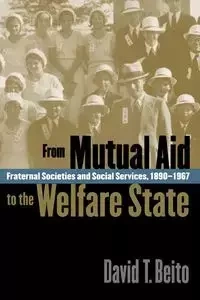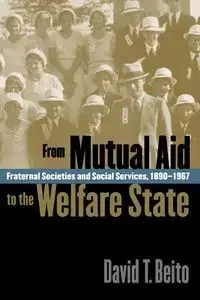From Mutual Aid to the Welfare State - David T. Beito
From Mutual Aid to the Welfare State - David T. Beito
- Fraternal Societies and Social Services, 1890-1967
AutorzyDavid T. Beito
Much more than a means of addressing deep-seated cultural, psychological, and gender needs, fraternal societies gave Americans a way to provide themselves with social-welfare services that would otherwise have been inaccessible, Beito argues. In addition to creating vast social and mutual aid networks among the poor and in the working class, they made affordable life and health insurance available to their members and established hospitals, orphanages, and homes for the elderly. Fraternal societies continued their commitment to mutual aid even into the early years of the Great Depression, Beito says, but changing cultural attitudes and the expanding welfare state eventually propelled their decline.
EAN: 9780807848418
Symbol
437EZF03527KS
Rok wydania
2000
Elementy
338
Oprawa
Miekka
Format
15.6x23.4cm
Język
angielski
Strony
338

Bez ryzyka
14 dni na łatwy zwrot

Szeroki asortyment
ponad milion pozycji

Niskie ceny i rabaty
nawet do 50% każdego dnia
Niepotwierdzona zakupem
Ocena: /5
Symbol
437EZF03527KS
Kod producenta
9780807848418
Autorzy
David T. Beito
Rok wydania
2000
Elementy
338
Oprawa
Miekka
Format
15.6x23.4cm
Język
angielski
Strony
338

During the late nineteenth and early twentieth centuries, more Americans belonged to fraternal societies than to any other kind of voluntary association, with the possible exception of churches. Despite the stereotypical image of the lodge as the exclusive domain of white men, fraternalism cut across race, class, and gender lines to include women, African Americans, and immigrants. Exploring the history and impact of fraternal societies in the United States, David Beito uncovers the vital importance they had in the social and fiscal lives of millions of American families.
Much more than a means of addressing deep-seated cultural, psychological, and gender needs, fraternal societies gave Americans a way to provide themselves with social-welfare services that would otherwise have been inaccessible, Beito argues. In addition to creating vast social and mutual aid networks among the poor and in the working class, they made affordable life and health insurance available to their members and established hospitals, orphanages, and homes for the elderly. Fraternal societies continued their commitment to mutual aid even into the early years of the Great Depression, Beito says, but changing cultural attitudes and the expanding welfare state eventually propelled their decline.
EAN: 9780807848418
Much more than a means of addressing deep-seated cultural, psychological, and gender needs, fraternal societies gave Americans a way to provide themselves with social-welfare services that would otherwise have been inaccessible, Beito argues. In addition to creating vast social and mutual aid networks among the poor and in the working class, they made affordable life and health insurance available to their members and established hospitals, orphanages, and homes for the elderly. Fraternal societies continued their commitment to mutual aid even into the early years of the Great Depression, Beito says, but changing cultural attitudes and the expanding welfare state eventually propelled their decline.
EAN: 9780807848418
Niepotwierdzona zakupem
Ocena: /5
Zapytaj o produkt
Niepotwierdzona zakupem
Ocena: /5
Napisz swoją opinię

